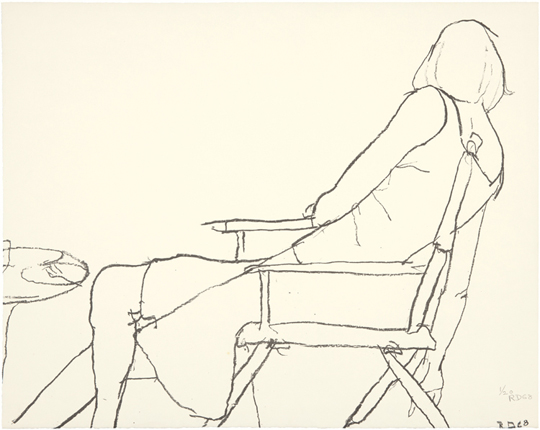
Richard Diebenkorn. “Seated Woman,” 1968. Lithograph. Image: 19 3/4 x 25 inches (50.2 x 63.5 cm); sheet: 19 3/4 x 25 inches (50.2 x 63.5 cm). Published by Kansas City Art Institute, edition of 20. Image courtesy Greenberg Van Doren Gallery, New York. ©Estate of Richard Diebenkorn.
Fans of contemporary paper-based art are indulged with an especially fine and varied dining experience this spring and summer in New York. Groups shows at The Museum of Modern Art, The International Print Center New York, The Lower East Side Printshop, Susan Inglett Gallery, Larissa Goldston Gallery, and Christopher Henry Gallery, among others, offer opportunities to relish a wide range of outstanding examples of both editioned and unique works on paper (both of-the-moment and historical), while solo exhibitions for Richard Diebenkorn, Nicole Eisenman, Shepard Fairey, and Diane Victor showcase the exceptional talents of these four artists in the realm of prints. As Ink goes to press, three of these exhibitions have closed (Diebenkorn, Eisenman, Victor), but there is still time to experience the others (though one must move at lightning speed to catch a few of them, closing today or over the weekend).
Richard Diebenkorn: Prints 1961-1992 at Greenberg Van Doren Gallery (closed June 29), was an exceedingly rare treat of the highest order. Organized to complement a traveling exhibition of his Ocean Park series that is currently on view at the Corcoran Gallery of Art through September 23 (its final venue), this carefully curated exhibition showcased a selection of pristine impressions from the artist’s estate. The visitor was greeted with a small group of rarely-exhibited lithographs from the artist’s figurative period of the sixties (many can be seen here). Seated Woman, 1968, is among the most stunning and elegant figurative images of the Twentieth Century. The larger space of the gallery was a selection of Ocean Park Series prints, most of which were printed at Crown Point Press. In her essay for the exhibition catalogue, CPP founder and master printer Kathan Brown, who had a long and fruitful relationship with the artist, states these prints are “the most complex and subtle use of color aquaint that I know of by any artist at any time in history” – a profound statement from one who has dedicated her life to that medium. (If you missed it, a handful of the same prints are on view in the exhibition at the Corcoran.)
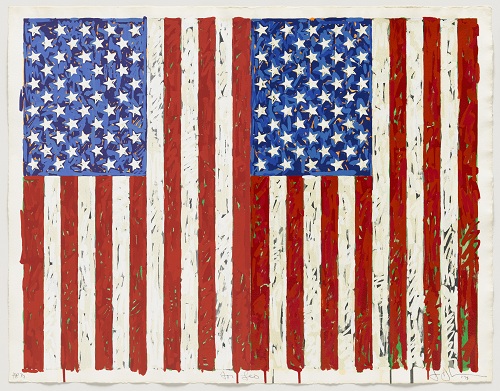
Jasper Johns. “Flags I.” 1973. Screenprint, 27 3/8 x 35 1/4″ (69.5 x 89.5 cm). Publisher: the artist and Simca Print Artists Inc., New York. Printer: Simca Print Artists Inc., New York. Edition: artist’s proof before the edition of 65. The Museum of Modern Art, New York. Gift of Barbara Bertozzi Castelli, New York, 2011. © 2012 Jasper Johns / Licensed by VAGA, New York.
Master prints from the past century and beyond are on view in New to the Print Collection: Matisse to Bourgeois at The Museum of Modern Art through January 7. It rewards with a number of rarities, showcases the gamut of printmaking techniques, and presents a handful of engaging artists’s books. The first gallery presents work by European Modern masters. Elaborate hand-colored etchings by the nineteenth-century genius of macabre, James Ensor–the color remarkably preserved–stand in contrast to a number of intimately sweet (but never sticky) early etchings and monotypes by Matisse. Nearby, two states (III and VII, of seven) of Picasso’s iconic Weeping Woman, 1937, allow a glimpse into the development of this complex masterpiece. Also in this room are exquisitely-conceived books by Jean Fautrier and Alberto Burri–two fascinating mid-Century European artists who are lesser-known to American audiences: these works help to make the case that the situation should be remedied. The center space features a number of conceptual works by Thomas Bayrle, Marcel Broodthaers, Liliana Porter, Luis Camnitzer, and Mel Bochner, each of which rewards the viewer who spends the time to unravel their puzzles. The sherbet tones of Warhol’s unique screenprint series, Sunset, 1972 (four variants on view), provide a refreshing dessert after the substantial main course of this space. Next, a pristine impression of Flags I, 1973, by Jasper Johns, who reinvented printmaking for contemporary expression, provides a fitting transition to the final gallery, in which works from the past decade demonstrate the explosion that ensued. Vija Celmins’s exquisite and intimately-scaled mezzotint, Starfield, 2010, complements an oversized galaxy-like cyanotype by Christian Marclay titled Allover (Genesis, Travis Tritt, and others), 2008, which the artist made by unraveling old-school audio tapes and strewing them over the surface of photo-sensitized paper. Nearby, Glenn Ligon’s breakthrough series Untitled (Four Etchings), 1992, is shown in its entirety (discussed in the May 2012 issue of this column). Opposite, Lisa Yuskavage’s wildly apocalyptic print, Outliers, 2011, announces what digital printmaking can do in the hands of a talented artist. As promised in the exhibition title, there are also a handful of quietly astonishing works by the provocative and innovative master Louise Bourgeois – a portfolio of 36 small prints greets visitors on the mezzanine as they enter the space, while two monumental etchings close the exhibition.
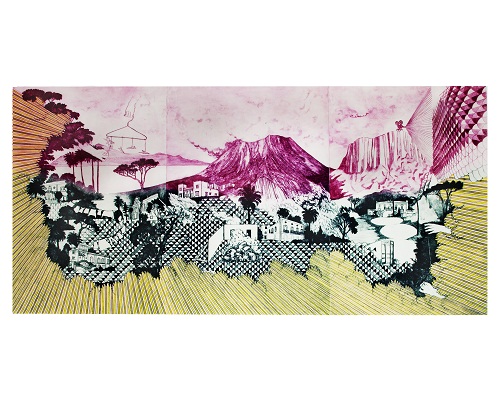
Serena Perrone, “Approach and Descent,” 2011. Drypoint on Japanese paper with hand coloring. Paper: 35 3/4 x 71 1/4 inches. Printed by the artist, published by Cade Tompkins Projects, edition of 7. Image courtesy International Print Center, New York.
For a hedonistic plunge into the panoply of hyper-contemporary prints, visit New Prints 2012/Summer at the International Print Center New York in Chelsea, on view through July 27. Continuing IPCNY’s tradition of artist-selected exhibitions, this group of 78 prints–each of which was created over the past year–was selected by Shahzia Sikander from a record pool of 2,500+ entries. In spite of this glut of material, Sikander did an excellent job of giving the exhibition solid coherence: her reasoning behind the process is revealed in a published interview available online. Sikander’s proclivities for intricacy, vivid color, craftsmanship, pattern, storytelling, and extremes of scale are apparent in a number of the works on view. The artists span the range of career status, from established to nascent: by extension, some of the works were produced in professional workshops and others were self-printed. A variety of formats–from large-scale installation, sculptural works, artists’s books, to traditional single-sheet prints–show the rich array of approaches in printmaking today. Three of the artists in the exhibition–Traci Horgen, Serena Perrone, and Keigo Takahashi–will discuss their work in the gallery this Monday, July 9, from 6-8 (RSVP appreciated: [email protected]).
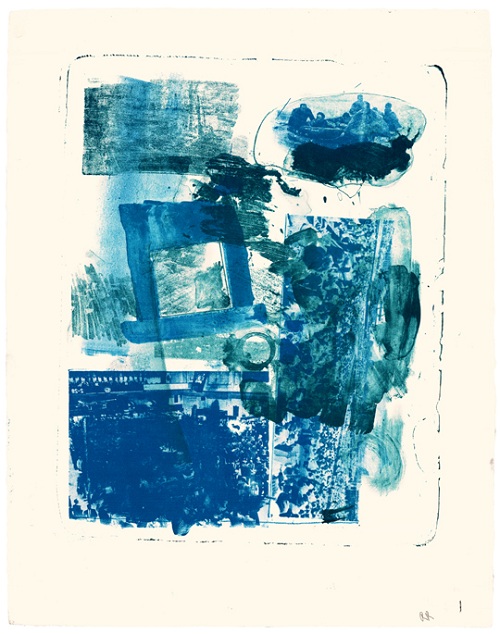
Robert Rauschenberg, “Stunt Man I,” 1962. Lithograph in 2 colors on Japan. 22 1/2 in. x 17 1/2 in. (57.15 cm x 44.45 cm). Published by Universal Limited Art Editions, West Islip, New York, edition 37. Image courtesy Larissa Goldston Gallery, New York.
Nearby, “Kind of Blue” at Larissa Goldston Gallery (closing today), serves a modest but tantalizing spread of gems that span the illustrious history of the fabled workshop Universal Limited Art Editions, from Robert Rauschenberg’s Stunt Man I, 1962, to James Rosenquist’s most recent edition, The Memory Continues but the Clock Disappears, 2011. Also on view are two works by Jasper Johns, an early print by Ellen Gallagher, two images by Kiki Smith, a raucous Carroll Dunham etching, and a rare, early lithograph by Sam Francis.
In an uncommon turn of events, some of the most talked-about exhibitions of the past gallery season were print shows: Nicole Eisenman: Woodcuts, Etchings, Lithographs and Monotypes at Leo Koenig, Inc. (closed June 30); and Shepard Fairey: Harmony & Discord at Pace Prints/Chelsea (closes today). As illuminated by Faye Hirsch in an online interview with the artist, Eisenman’s exhibition was the result of a self-imposed challenge in which she spent several months making only prints: during this time she became a serious student not only of her chosen processes, but also the history of printmaking. In light of the complexities of tackling a number of unfamiliar and highly technical media, Eisenman was wise to stick to familiar subject matter–the works convey disaffected drinking scenes, surrealistic/expressionistic portraits and nudes, and the occasional macabre figure that have been features of her work over the past several years–albeit with a fresh perspective. Shepard Fairey’s exhibition at Pace–which showcases this street artist/DIYer’s first collaboration with a major print workshop–likewise presents variations on his familiar style. Best known for his OBEY GIANT street images and 2008 presidential-campaign image of Obama, this body of work continues his long-term engagement with political and social themes. The exhibition presents a cadre of images in various formats in the artist’s signature palette of red, black, and beige. Though he is a seasoned printmaker, working with the considerable resources at Pace Editions allowed Fairey to work on a scale he had not previously attempted, and to explore unusual techniques, such as silkscreen on laser-engraved metal.
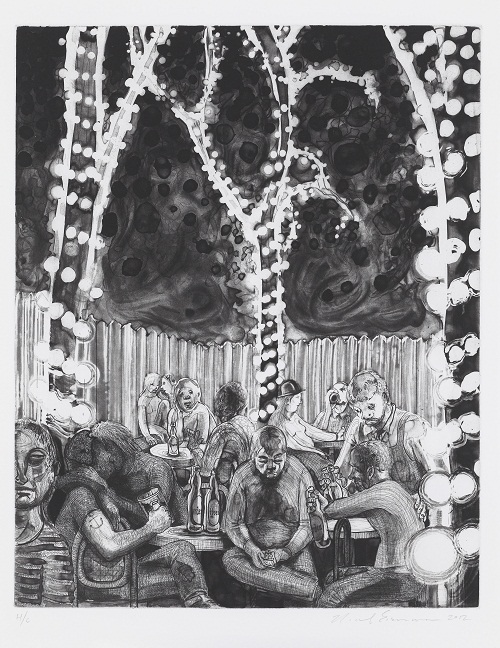
Nicole Eisenman, “The Met,” 2012. Etching and aquatint on photogravure Hahnemühle bright white paper. Image: 15 1/8 x 12 1/8 inches; sheet: 20 ¾ x 16 ½ inches. Published by Harlan & Weaver, New York, edition of approximately 20 (currently in production). Image courtesy Leo Koenig, Inc., New York.
Presenting an historical context for the role of printed material in counterculture is Screw You at Susan Inglett in Chelsea, on view through July 27. Curated by David Platzker of Specific Object, this exhibition explores a somewhat forgotten mini-movement of the late 1960s and early 1970s (yet to be named), in which famous artists published tastefully explicit images in ‘zines in an effort to liberate pornography from the wallows of poor taste. Contributors include Brigid Berlin, John Chamberlain, Dan Graham, Peter Hujar, Yayoi Kusama, Mel Ramos, Pablo Picasso, Carolee Schneemann, Robert Stanley, Betty Tompkins, and Andy Warhol.
By contrast, Diane Victor: Reap and Sow at David Krut Projects (closed June 30) offered a more sobering and meditative experience in the vein of politically-grounded art. The artist, who was featured in last year’s Impressions from South Africa: 1965 to Now at MoMA, has long engaged with the tangled web of her country’s history, turning out technically-brilliant allegorical works that speak powerfully to its corruption and inequalities. Her second exhibition with the gallery, Reap and Sow included her signature smoke drawings as well as a large number of etchings and drypoints. The prints, in particular, demonstrate Victor’s deep engagement with the history of political art, which was often expressed in printmaking due to the medium’s ability to be reproduced and distributed widely.
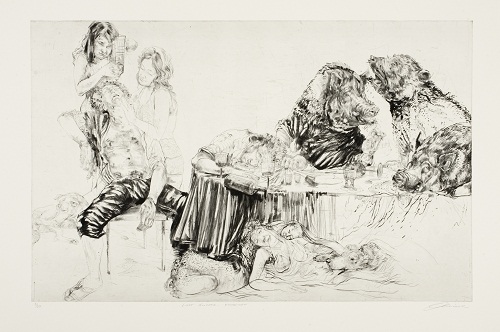
Diane Victor. “Last Supper (Enswined),” 2011. Drypoint. Sheet: 28 x 39 inches. Published by David Krut Projects, New York and Johannesburg, edition of 30. Image courtesy David Krut Projects, New York.
In the Fashion District, a number of workshops present the fruits of their labors over the past year. The Lower East Side Printshop is showing its annual Editions exhibition through July 8, which features the results of the workshop’s residency program with invited artists. This year’s talent includes Enoc Perez, Jennie C. Jones, Hong Seon Jang, Darina Karpov, and David Kramer. As always, the exhibition is accompanied by a catalogue discussing each artist’s project in detail–this time written by the esteemed curator emerita of the New York Public Library’s print collection, Roberta Waddell. A block away, Dieu Donné Papermill is also featuring new editions, created for the workshop’s annual subscription program, by Rico Gatson, Michael St. John, and Allyson Strafella in Paper Variables (through August 3). Also nearby, the Robert Blackburn Printmaking Workshop presents One Year Later: Part I (through August 3, with an opening reception July 12, 6-8), exhibiting the work of its 2011 Studio Immersion Project Fellows Joseph Burwell, Ethan Greenbaum, Naomi Reis and Beth Sutherland. One Year Later: Part II will be shown later in the summer, featuring Veronica Frenning, Erik Hougen and Elaine Sui-hui.
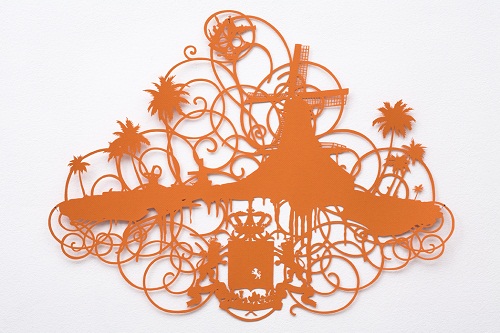
Dylan Graham. “Dissent in the Colonial Pacific,” 2009-10. Hand-cut archival paper. 20 x 25 inches. Photo: Shinji Otani. Courtesy Christopher Henry Gallery, New York.
Downtown, A Cut Above: 12 Paper Masters at Christopher Henry Gallery (through July 15 with a closing reception July 12, 6-9), features a number of captivating paper-based works and book manipulations by artists from around the world. This subcategory of contemporary art was explored in-depth in the critically-acclaimed exhibition Slash: Paper Under the Knife at the Museum of Arts and Design in 2009, and many of the same artists are shown here, including Brian Dettmer, Adam Fowler, Doug Beube, Chris Gilmour, and Dylan Graham. United by technique and materials, the works on view manifest a wide range of subjects, from the decorative to the political. Dylan Graham’s Dissent in the Colonial Pacific, 2009-10, embodies both at once–its attractive and intricate form slowly reveals its somewhat ominous content: an examination of the ramifications of Dutch colonial activity in the East Indies. Also showing downtown is Jack Vickridge/Lizzie Wright at Nicelle Beauchene (through August 3), which contrasts the woodcuts of Vickridge with the wooden relief sculptures of Wright, both of whom explore spare geometric abstraction in their work.
And that brings us to the conclusion of this whirlwind tour. Though there is inevitably something overlooked in this roundup, it gives a sense of the astonishing variety and quality of printmaking and paper-based media exhibitions to be experienced this summer in New York. Pace yourselves, enjoy, and feel free to share your own thoughts in the comments below.




Pingback: Diane Victor featured on Art21 blog | DAVID KRUT PROJECTS